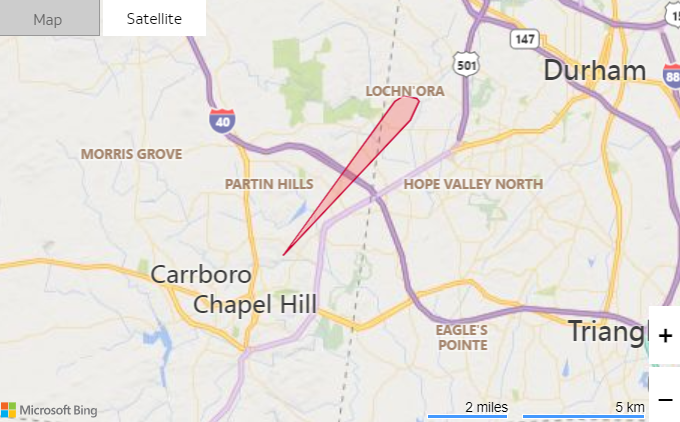After years of debate, the Orange County Transit Plan could be approved at Thursday night’s County Commissioners meeting.
The main piece of the plan is the much-debated Durham-Orange Light Rail Transit line. The 17.7-mile light rail line has a total projected cost of $3.3 billion, including financing, and has split public opinion.
Durham County Commissioners voted to approve the transit plan and the new cost-sharing agreement with Orange County at its Monday night meeting.
The newly negotiated terms bring Orange County’s cost share of the line from 20 percent down to 16.5 percent.
Some Orange County Commissioners appeared more comfortable with the arrangement moving forward under the new terms at a work session last Thursday.
The local cost of the project was originally slated for 25 percent and would be funded by a sales tax increase approved by voters from Orange and Durham counties. Another 25 percent would come from the state and the remaining 50 percent would be funded by the federal government.
That outline changed when the state capped its contribution to light rail projects at 10 percent.
That cost increase led some community members to advocate for increased bus services rather than the light rail line.
UNC Chancellor Carol Folt and UNC Health Care System CEO Dr. William Roper sent a letter to Orange County Commissioners on Wednesday encouraging commissioners to vote to approve the transit plan.
The letter said the light rail line is “essential to our future.” The officials said the transit line was “vital” to ensure the future of the county while remaining a “vibrant and sustainable place to work and live.”
Folt and Roper added UNC had been planning for light rail stations in the master planning process for “more than 15 years.”
The Chapel Hill Town Council also approved a letter of support for the light rail line on Monday night. But the letter also said the council wished “to advocate for increased financial resources for the Chapel Hill Transit system which are necessary to meet future growth demand, to connect riders to station areas and to make essential “last mile” connections.”
The letter also requests Chapel Hill Town Council, as the operator of Chapel Hill Transit, be added “as a signatory to the interlocal Implementation Agreement for the Orange County Transit Plan” while allowing Chapel Hill staff to work on the plan moving forward.
Increased bus service overall was also a request from the council.
Meanwhile, a group of more than 100 Orange County residents – including Chapel Hill Town Council member Nancy Oates – also submitted a letter to commissioners urging the board to oppose the plan.
The letter said the light rail proposal “introduces extraordinary financial risks.” The letter goes on to criticize GoTriangle, saying the organization’s handling of the project “is responsible for the latest abbreviated decision process that is so rushed that there hasn’t been sufficient time for critical public review or reasonable vetting of the project.”
In a letter sent from GoTriangle to the county commissioners on Tuesday, the regional transit organization said it was willing to renegotiate terms of the interlocal agreement between the county, GoTriangle and the Durham-Chapel Hill-Carrboro Metropolitan Planning Organization regarding the allocation of bus revenues.
If approved by commissioners, the plan could then be submitted to the Federal Transit Administration. The FTA could then approve the project to move forward into the engineering phase.
The Orange County Commissioners will meet at seven o’clock Thursday night at the Whitted Building in Hillsborough.
Related Stories
‹
![]()
Budget Corrections Bill Would Allow Durham-Orange Light Rail to Move ForwardThe technical corrections bill passed both chambers of the legislature and now awaits the signature of Governor Roy Cooper to become law.**** After appearing, once again, to be targeted by the North Carolina General Assembly, it seems as though the Durham-Orange Light Rail project has fought off its impending death. The 17.7-mile light rail […]

Days After Historic Rain, Chapel Hill and Durham Under Another Flash Flood WarningMany areas of Orange County, Chatham County and the rest of central North Carolina are again under a flash flood warning on Wednesday.

Widespread AT&T Outage in Orange and Durham Counties Still OngoingAT&T internet and television customers in parts of Orange and Durham County have been without service since around 10 p.m. Thursday night. AT&T described the source of the outage as a “fiber equipment failure” on its website. It posted a timeframe of 24-48 hours until restoration at the time of the outage on Thursday night. […]

High School Football Round-Up: Week 5Every week during the season, Chapelboro will post the scores of local high school football games. Here are the scores from Week 5! Results from Week 4 can be found here. Chapel Hill (4-0): Idle Up next: vs. East Chapel Hill Cedar Ridge (1-3): Lost to Person County, 76-8 Up next: vs. Northwood East […]
![]()
Budget Proposal Targets Durham-Orange Light Rail FundingNorth Carolina Republican legislators unveiled their budget proposal late on Memorial Day. Durham Democratic state senator Floyd McKissick said that in three lines the budget “placed in jeopardy the future funding of the light rail system between Durham and Chapel Hill.” McKissick and other local elected officials have derided the budget and the process Republican […]
![]()
Final Durham-Orange Light Rail Public Hearing Set for Tuesday NightThe final public hearing before local officials are set to vote on the potential light rail project that would connect Orange and Durham counties is set for Tuesday night. The Orange County Commissioners are scheduled to vote on the overall Orange County Transit plan, which includes the Durham-Orange Light Rail project, on April 27. The […]
![]()
Chapel Hill Continuing Planning for Potential Durham-Orange Light Rail Transit StationsThe Chapel Hill Town Council discussed possibilities surround light rail in Orange County. The town council received an update from GoTriangle on the community workshops the organization had been holding. The meetings were meant to give GoTriangle and elected officials a better idea of how the public felt about the Durham-Orange Light Rail plan. Gateway […]
![]()
Orange County Facing April 30 Deadline for Light Rail FundingAfter Orange County committed in December to consider spending an additional $40 million over a 10-year period on the Durham-Orange Light Rail project, the commissioners once again have a major decision to make. The Federal Transit Administration is looking for additional documentation to ensure the project can continue as planned. GoTriangle general manager Jeff Mann […]
![]()
GoTriangle: Additional Local Funding May Not Be Necessary for Durham-Orange Light RailFunding the Durham-Orange Light Rail project has been a contentious topic in recent months. But GoTriangle now says it may only need additional local funding as a safety net for the project – not as an integral piece of the funding. GoTriangle staff presented the updated plan to the organization’s Board of Trustees on Wednesday. […]

Durham Budget Director Dies in Orange County After Being Struck By DriverAn Efland motorist faces charges after striking and killing a bicyclist on Thursday morning, who was the City of Durham’s budget director. John Allore was cycling along the two-lane Bradshaw Quarry Road near Orange Grove Road in southwestern Orange County when he was struck by the driver of a 2020 Toyota car, according to the […]
›





